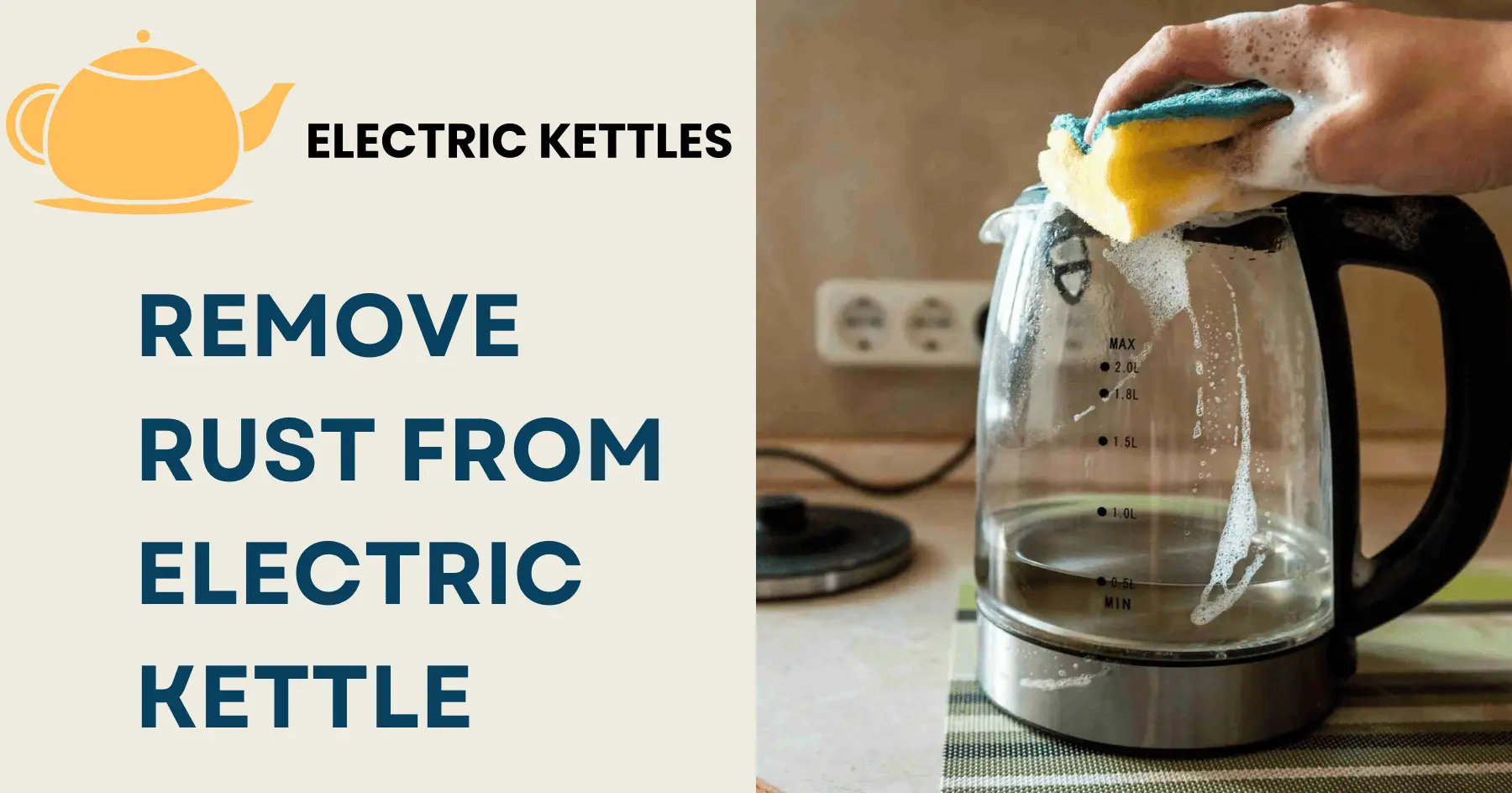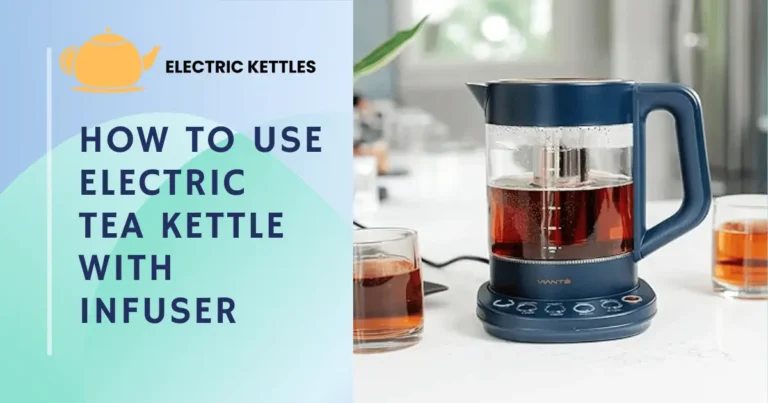3 Methods to Remove Rust From Electric Kettle
Rust appears in electric kettles when metal parts are exposed to water and air for a long time. Minerals in hard water can speed up rust formation. If you don’t clean an electrcic kettle often, rust can build up quickly.
Rust can affect the taste of water and might even make it unsafe to drink. It also reduces the lifespan of your kettle by weakening the metal. Cleaning rust regularly helps your kettle last longer and ensures safe, clean water every time you use it.
Table of Contents
Materials Needed
- White Vinegar: A natural acid that dissolves rust effectively. Safe for use on stainless steel and metal surfaces. Easily found in most kitchens or grocery stores.
- Baking Soda: Mild abrasive that helps scrub away rust without scratching the kettle. It reacts with vinegar for a powerful cleaning effect. Affordable and easy to use.
- Lemon Juice: Contains citric acid, which breaks down rust stains. Leaves a fresh scent after cleaning. Also a great eco-friendly option for removing mild rust.
- Salt: Adds grit to lemon juice or vinegar, helping to scrub away tough rust spots. Enhances the effectiveness of natural acids. Cheap and readily available in most homes.
- Soft Cloth or Sponge: Used to wipe away rust and prevent scratches. Ideal for gentle cleaning after applying cleaning solutions. Must be non-abrasive to avoid damaging the kettle surface.
- Brush with Soft Bristles: Helps to reach tricky corners and tight spaces inside the kettle. Useful for scrubbing areas where rust is hard to remove. Should be gentle to avoid leaving scratches.
- Commercial Rust Remover: Designed specifically to remove heavy rust quickly. Useful for severe rust build-up that doesn’t respond to natural methods. Follow safety instructions when using to prevent damage.
Methods to Remove Rust from an Electric Kettle
1. Using Vinegar and Baking Soda
Fill the kettle with equal parts white vinegar and water, then bring it to a boil. Let the mixture sit in the kettle for about an hour to loosen the rust. Once cooled, empty the kettle and add a tablespoon of baking soda. Scrub the rusty areas with a soft brush or sponge, focusing on spots where rust is visible. Rinse thoroughly with water to remove any residue. This method is effective for mild to moderate rust and helps eliminate mineral deposits.
2. Using Lemon and Salt
Cut a fresh lemon in half and coat the cut side with coarse salt. Use the salted lemon half to scrub the rust stains inside the kettle, squeezing gently as you scrub to release lemon juice. For tougher stains, mix lemon juice with a small amount of salt to form a paste and apply it to the rust. Let it sit for 15-20 minutes, then scrub with a cloth or sponge. Rinse well with water. This method is ideal for light rust and adds a pleasant, natural scent to the kettle.
3. Using Commercial Rust Removers
Choose a commercial rust remover that is safe for use on kitchen appliances. Follow the product instructions carefully, usually applying the remover to the rusted areas and letting it sit for a specified time. Use a brush or sponge to scrub the rust away, taking care to rinse the kettle thoroughly afterward. Wear gloves and ensure good ventilation while using these products, as they can be strong. This method is best for dealing with heavy rust that is difficult to remove with natural methods.
How to Avoid Damage to the Kettle
Always use a soft cloth, sponge, or brush with soft bristles to clean your kettle. Avoid using steel wool or abrasive pads, as they can scratch and damage the surface. Gentle tools help remove rust without leaving marks or causing wear and tear on the kettle.
Stick to natural cleaners like vinegar, baking soda, or lemon juice whenever possible. Strong chemicals or bleach can corrode the metal and damage the kettle’s interior. If you must use a commercial rust remover, make sure it’s safe for kitchen appliances and follow the instructions closely.
Always refer to the kettle’s user manual for specific cleaning guidelines. Each kettle may have unique materials or coatings that require special care. Regular maintenance and using only approved cleaning methods will help extend the kettle’s life and keep it functioning well.
Preventing Rust in the Future
- Regular Cleaning and Drying: Clean the kettle regularly to prevent rust build-up. After each use, empty the kettle completely and rinse it with fresh water. Wipe the inside and outside with a soft cloth and ensure it is fully dry before storing. Regular cleaning helps remove mineral deposits and moisture, which can cause rust over time.
- Use Filtered or Distilled Water: Tap water often contains minerals that can lead to rust and scale build-up. Using filtered or distilled water reduces the minerals inside the kettle, lowering the chances of rust forming. This simple change can help keep your kettle in good condition for a longer time.
- Store in a Dry Place: Store the kettle in a cool, dry place when not in use. Avoid keeping it in damp or humid environments, as moisture can accelerate rust formation. Consider leaving the lid open when storing to let any remaining moisture evaporate and keep the interior dry.
FAQs
Q1. Can I use baking soda alone to remove rust from my kettle?
Yes, you can use baking soda alone by making a paste with water. Apply it to the rusty areas, let it sit for a few minutes, then scrub gently with a soft sponge.
Q2. How often should I clean my electric kettle to prevent rust?
It’s best to clean your electric kettle once a week if you use it daily. This routine helps remove mineral deposits and prevents rust from forming.
Q3. Is it safe to drink water from a rusty kettle?
No, it is not safe. Rust can affect the taste and quality of the water and might pose health risks. Clean your kettle regularly to avoid rust.
Q4. Can I use cola to remove rust from my kettle?
Yes, cola contains phosphoric acid, which can help remove rust. Pour cola into the kettle, let it sit for a few hours, then rinse and scrub away the rust.
Q5. What should I do if rust returns after cleaning?
If rust returns, clean the kettle more frequently and ensure it’s completely dry after each use. Using filtered water to minimize mineral deposits that cause rust.
Conclusion
Removing rust from your electric kettle is simple and can be done with common household items like vinegar, baking soda, lemon, and salt. Regular cleaning and using the right methods will help keep your kettle free of rust. Always choose gentle tools and avoid harsh chemicals to protect the kettle’s surface.
Clean your kettle regularly, use filtered water, and store it in a dry place to avoid rust build-up in the future. By taking these simple steps, you can extend the life of your kettle and ensure it remains safe to use. Keeping your kettle rust-free will also provide better-tasting water every time you use it.







